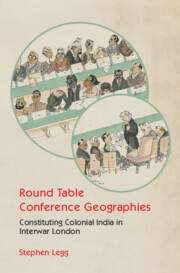Book contents
- Frontmatter
- Contents
- List of Figures and Tables
- Acknowledgements
- Note on Conversions, Spellings and Abbreviations
- 1 Introduction: Squaring Round Tables
- Part I Geographical Imaginations
- Part II Conference Infrastructures
- Part III The Conference City
- Part IV Representations
- Notes
- References
- Index
- Miscellaneous Endmatter
5 - Staffing the Conference: Experts and Subaltern Diplomats
Published online by Cambridge University Press: 15 January 2023
- Frontmatter
- Contents
- List of Figures and Tables
- Acknowledgements
- Note on Conversions, Spellings and Abbreviations
- 1 Introduction: Squaring Round Tables
- Part I Geographical Imaginations
- Part II Conference Infrastructures
- Part III The Conference City
- Part IV Representations
- Notes
- References
- Index
- Miscellaneous Endmatter
Summary
Once the conference method had taken shape, the Indian and British governments collaborated on making it manifest in the people and places of the meeting itself. The first conference session cost £79,646 [£3,646,624] in total, expenditure being covered by the British and Indian governments. Although Table 5.1 suggests the Government of India contributed 46 per cent more than the British, these figures do not cover many of the official and social events organised by the British government (see Chapter 8). The ‘Chief’s Fund’ refers to the princes’ fund to support members of the Indian states, while the Social Club refers to the accommodation and facilities provided for Indian delegates in Mayfair (see Chapter 7). The ‘actual conference’ costs concerned the diplomatic materials and infrastructure within and around St James’s Palace (see Chapter 6). Totalling £6,404, these costs amounted to only 8 per cent of the formally accounted expenditure, the vast majority being spent on assembling the delegates and staff in London. This acts to remind us that while buildings, tables, texts, cameras and microphones form one type of infrastructure, people themselves also form vital infrastructures (Graham and McFarlane 2014). The majority of funding went to the delegates, keeping them well housed, paid and dressed (non-British delegates visiting Britain for the first time received a £100 [£4,578] clothing ‘outfit allowance’ to ensure they were not sartorially disadvantaged).
The accounting categories in Table 5.1 also embed within the archive the distinctions made between those who made this diplomatic event happen. The first category regarded the British Indian delegates, who evidence Thakur’s (2021, 13) assertion that Indian diplomacy pre-dated independence. Though the question of whether there were international relations within the British Empire was hotly debated at this time (Gorman 2012), the delegates engaged in Nicolson’s (1939, 17) broader definition of diplomacy as ‘the ordered conduct of relations between one group of human beings and another group alien to themselves’. The third and fourth categories took in those who supported diplomacy, as government advisors and members of the bureaucratic secretariat. These actors are increasingly considered to be part of ‘diplomacy’, as defined by Scott- Smith and Weidesbrode (2019, 3) as ‘any action, setting, or phenomenon that represents the interests, status, actions, or behavior of a polity vis-à-vis another.
- Type
- Chapter
- Information
- Round Table Conference GeographiesConstituting Colonial India in Interwar London, pp. 130 - 158Publisher: Cambridge University PressPrint publication year: 2023



